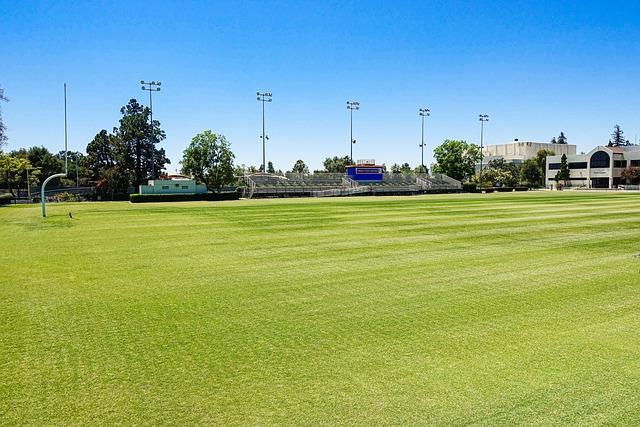In recent years, the spotlight on the psychological and emotional well-being of student-athletes has intensified, ushering in a new era of research that seeks to understand the complex interplay between academic pressures, athletic demands, and mental health. Frontiers in this evolving field are rapidly expanding as scholars and practitioners collaborate to uncover the unique challenges faced by these individuals and develop strategies to support their holistic success. This article explores the latest advancements in research on the psychological and emotional aspects of student-athletes, highlighting emerging findings that promise to reshape how educational institutions and sports organizations approach mental health and resilience in the competitive world of youth athletics.
Emerging Trends in Mental Health Support for Student-Athletes
Recent developments have shifted the focus towards holistic well-being in athletic programs, emphasizing that mental health is just as critical as physical fitness for student-athletes. Institutions are adopting innovative strategies such as mindfulness training, real-time mood tracking apps, and peer-led support groups. Integration of digital platforms allows for continuous monitoring, ensuring that potential mental health concerns are identified and addressed promptly. Moreover, collaborations between sports psychologists and coaching staff are becoming standard practice, fostering environments where vulnerability and emotional expression are encouraged rather than stigmatized.
Technological advancements have fueled the rise of personalized interventions that accommodate the unique pressures faced by student-athletes balancing academics and sports. Key initiatives currently gaining traction include:
- AI-driven analytics to predict stress episodes based on training and academic schedules
- Virtual reality simulations to build resilience and coping mechanisms under pressure
- Confidential teletherapy sessions tailored for athletic schedules
- Educational workshops emphasizing emotional intelligence and self-awareness
| Trend | Benefit | Implementation Level |
|---|---|---|
| AI Mood Prediction | Proactive intervention | Advanced |
| Mindfulness Programs | Enhanced focus & calm | Widespread |
| Teletherapy Access | Convenience & privacy | Growing |
| Peer Mentorship | Community support | Emerging |
In-Depth Analysis of Emotional Resilience Strategies in Competitive Sports
Recent studies reveal that emotional resilience in student-athletes functions as a critical determinant for not only maintaining performance under pressure but also for fostering long-term psychological well-being. Key strategies have emerged, highlighting the importance of mindfulness training,
Quantitative data further supports the efficacy of tailored emotional resilience programs across diverse athletic disciplines. The table below illustrates a summary of recent intervention outcomes categorized by strategy type, average improvement in emotional control, and athlete satisfaction ratings:
| Resilience Strategy | Emotional Control Improvement (%) | Athlete Satisfaction (1-5) |
|---|---|---|
| Mindfulness Training | 35% | 4.6 |
| Cognitive Restructuring | 28% | 4.3 |
| Peer-Support Systems | 22% | 4.4 |
| Biofeedback Techniques | 30% | 4.2 |
Experts advocate for integrating these resilience-building protocols within coaching curricula, underscoring how this cultural shift can reduce burnout and optimize performance longevity. Increasingly, institutions are adopting holistic training regimens that emphasize emotional intelligence alongside physical skill development, cultivating athletes who are better prepared to navigate the psychological demands inherent in competitive sport.
Innovations in Psychological Assessment Tools Tailored for Student-Athletes
Recent breakthroughs in psychological assessment tools have revolutionized the way experts evaluate the mental and emotional wellbeing of student-athletes. These innovations focus on creating tailored instruments that capture the unique stressors and motivational dynamics faced by young athletes balancing academics, training, and competition. Unlike traditional one-size-fits-all methods, new assessments incorporate real-time data collection via mobile apps and wearable technology, enabling a more nuanced understanding of fluctuations in anxiety levels, focus, and resilience. This approach allows coaches and sports psychologists to implement data-driven interventions that promote both performance and mental health.
Among the cutting-edge features integrated into these tools are:
- Adaptive questionnaires that change based on previous responses to reduce survey fatigue and enhance accuracy.
- Biofeedback sensors measuring heart rate variability to assess stress and recovery phases.
- Emotion recognition software utilizing facial expression analysis during training sessions.
Below is a comparative overview of conventional versus innovative assessment tools used for student-athletes:
| Feature | Traditional Tools | Innovative Tools |
|---|---|---|
| Data Collection Method | Paper-based surveys | Mobile apps & wearables |
| Response Adaptability | Static questions | Dynamic, adaptive questions |
| Real-Time Monitoring | No | Yes |
| Physiological Metrics | None | Heart rate, skin conductance |
| Emotional Recognition | Self-report only | Facial and voice analysis |
Expert Recommendations for Enhancing Wellbeing Programs on College Campuses
Maximizing the effectiveness of wellbeing initiatives requires a multifaceted approach tailored to the unique pressures student-athletes face. Experts emphasize the importance of integrating mental health education directly within athletic programs, rather than treating it as an ancillary service. Encouraging open conversations about stress, anxiety, and emotional resilience during team meetings or practice sessions fosters a culture of support and reduces stigma. Additionally, collaboration between athletic trainers, coaches, and mental health professionals is crucial to create a seamless support network that actively monitors the psychological wellbeing of athletes throughout their collegiate careers.
In terms of practical strategies, the following key recommendations have emerged to enhance campus wellbeing programs:
- Regular mental health screenings embedded within athletic medical assessments.
- Workshops focusing on coping mechanisms tailored to the dual demands of sports and academics.
- Peer mentorship programs that pair experienced athletes with newcomers to provide guidance and emotional support.
- Availability of confidential counseling services accessible at all hours to accommodate intensive training schedules.
| Program Element | Benefit | Implementation Tip |
|---|---|---|
| Mindfulness Training | Improves focus and reduces anxiety | Integrate short sessions into practice warm-ups |
| Resilience Workshops | Enhances coping strategies for setbacks | Use scenario-based learning to simulate stress |
| Social Support Groups | Fosters community and shared understanding | Encourage mixed-sport participation for broader peer networks |
Insights and Conclusions
As research continues to shed light on the complex psychological and emotional challenges faced by student-athletes, the frontiers of this field are expanding rapidly. Emerging studies emphasize the importance of tailored mental health support and resilience-building strategies, promising to transform not only athletic performance but overall well-being. With ongoing advancements, educators, coaches, and policymakers are better equipped to foster environments where student-athletes can thrive both on and off the field. The evolving insights mark a pivotal step toward holistic development in youth sports, underscoring the need for continued investment and attention in this critical area.




